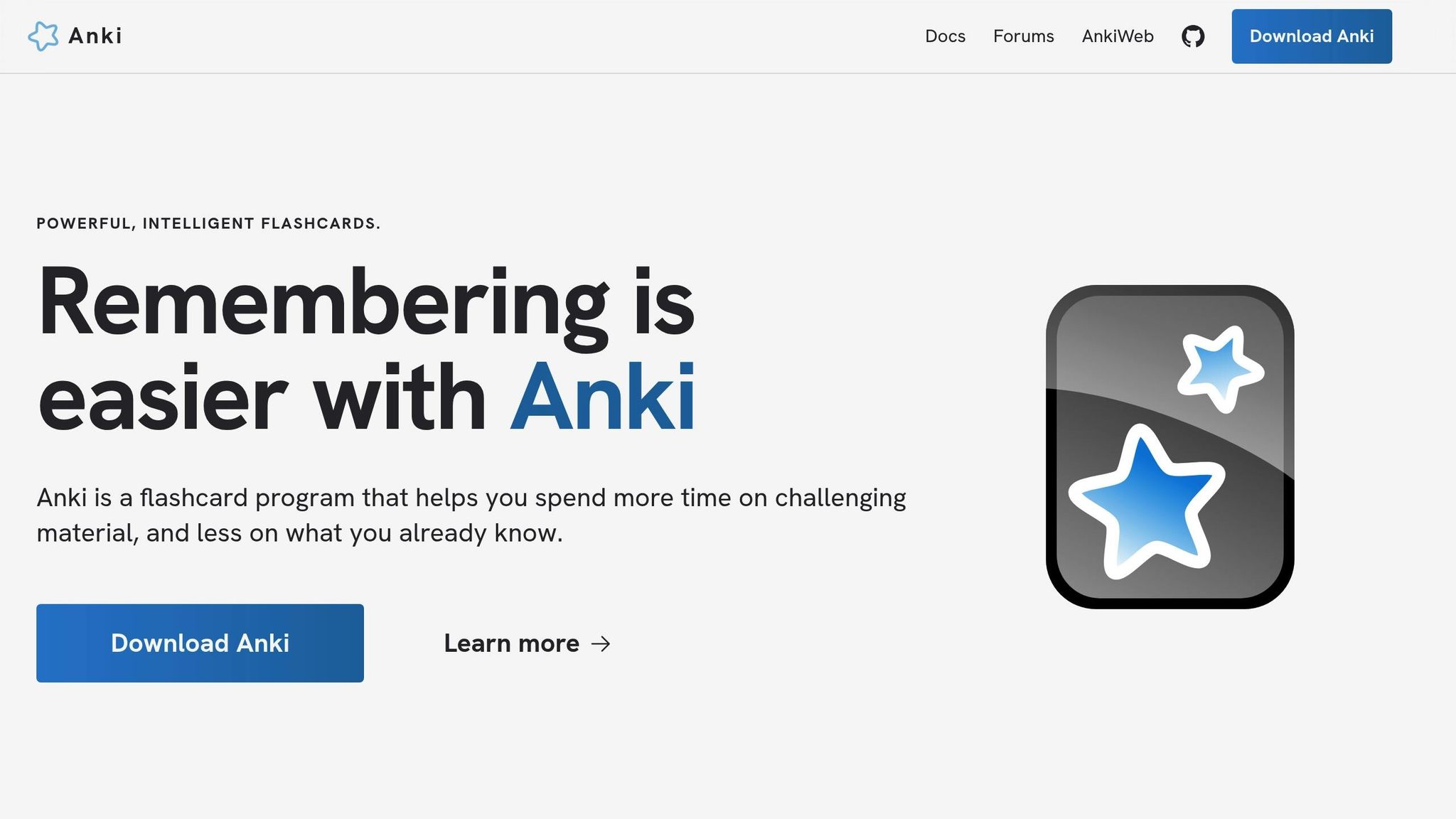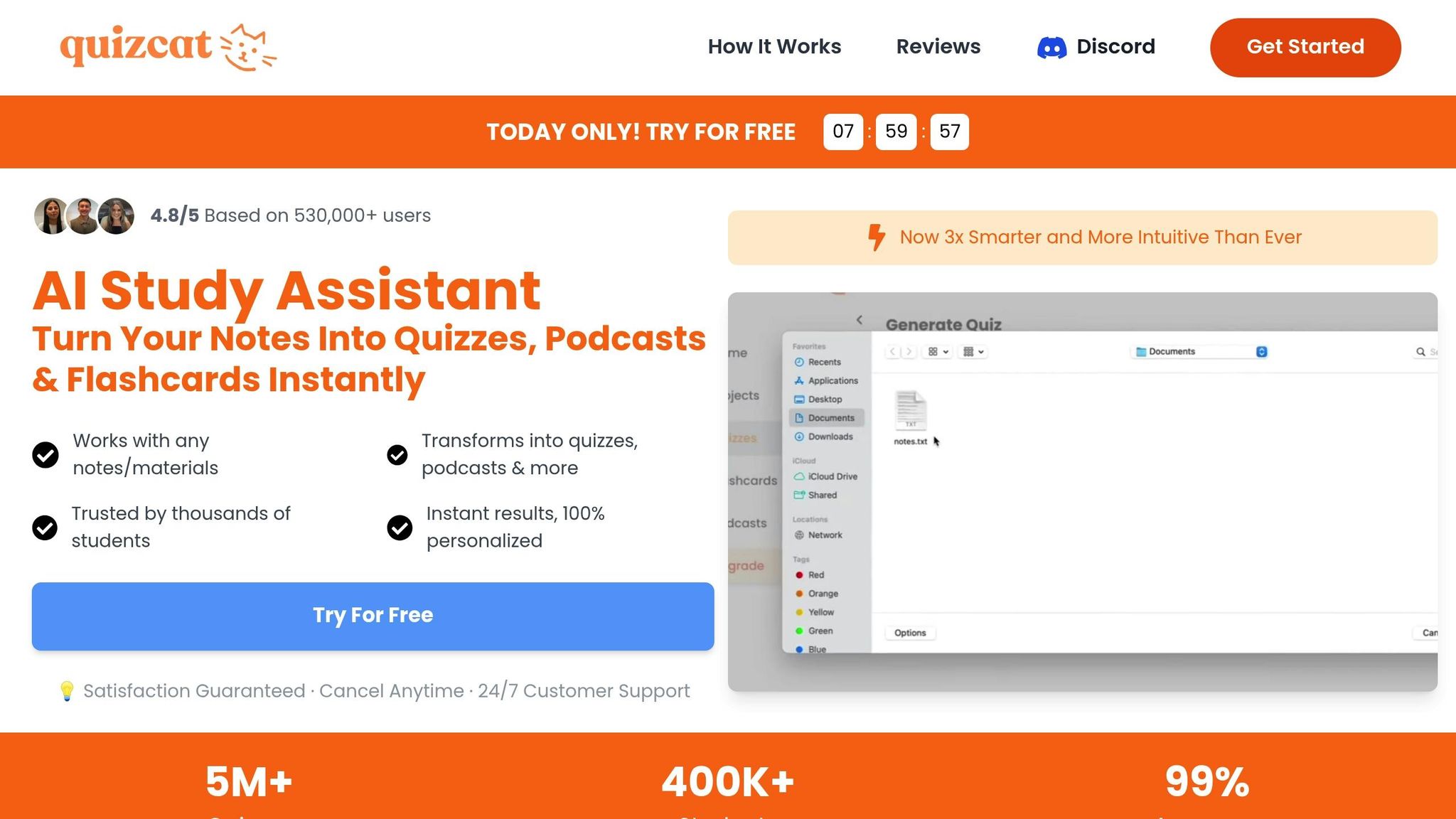
Ultimate Guide to AI Medical Flashcard Apps
Medical students face an overwhelming amount of material to learn, and traditional flashcards can take hours to create. AI-powered flashcard apps simplify this process by automatically generating flashcards, quizzes, and even audio content from uploaded notes. These tools save time, boost retention with techniques like spaced repetition, and adapt to individual learning styles.
Key Benefits of AI Flashcard Apps:
- Automatic Flashcard Creation: Upload notes (PDF, DOCX, etc.), and flashcards are ready in seconds.
- Smart Study Techniques: Features like spaced repetition and active recall improve long-term retention.
- Multi-Format Learning: Study with text, audio, or visual flashcards for flexibility.
- Progress Tracking: Get detailed analytics to focus on weak areas and measure improvement.
- Mobile Access: Study anytime, anywhere - even during commutes or workouts.
Quick Overview:
| Feature | Benefit |
|---|---|
| Automatic Flashcards | Saves hours of manual work. |
| Spaced Repetition | Locks information into long-term memory. |
| Audio Learning | Study hands-free while multitasking. |
| Exam Prep (USMLE, MCAT) | Breaks down complex topics efficiently. |
AI flashcard apps like QuizCat AI are transforming how medical students prepare for exams and clinical rotations, offering smarter, faster ways to study.
Using ChatGPT To Create Anki Flashcards in MINUTES (Save ...

Main Features of Medical AI Flashcard Apps
AI-driven medical flashcard apps have changed how students tackle complex medical topics, turning traditional study methods into more interactive and efficient learning experiences. These tools combine several features to create a customized and effective study process.
Automatic Flashcard Generation
One standout feature is the ability to automatically create flashcards. Using advanced algorithms, these apps can take study materials - like PDFs, DOCX, or TXT files - and turn them into fully-formed flashcard sets. Key concepts and definitions are extracted in seconds, saving time and effort.
"I was drowning in notes before I found this tool. Now, it turns everything into flashcards, quizzes, and even podcasts! Studying has never been this easy. Highly recommend!" - Emily Carter
Smart Review Scheduling
These apps use proven learning techniques to make studying more effective. Here's a quick breakdown:
- Spaced Repetition: Helps lock information into long-term memory.
- Active Recall: Boosts your ability to remember key details.
- Adaptive Difficulty: Adjusts the challenge level to keep you motivated without feeling overwhelmed.
Learning Progress Tracking
With built-in analytics, these apps monitor how well you're doing and adjust your study plan accordingly. They:
- Highlight areas where you need improvement.
- Create personalized study paths based on your performance.
- Offer detailed progress reports to show how much you've mastered.
"I was skeptical at first, but wow. The quizzes it makes from my notes are so spot-on. My test scores have gone up, and I actually enjoy studying now. Who even am I? 😅" - Sophia Martinez
This feature ensures that your study time is spent where it matters most.
Multi-Format Content Support
These apps go beyond traditional text-based flashcards by offering content in multiple formats, making studying more versatile and engaging.
| Format Type | Learning Benefit |
|---|---|
| Text-Based Cards | Great for quick reviews and recall |
| Audio Content | Perfect for studying on the go |
| Visual Elements | Simplifies complex medical concepts |
"Why didn't I know about this sooner? I can listen to my notes like a podcast on the bus - so convenient! My friends are all using it now too." - Olivia Brooks
Medical Student Applications
AI flashcard apps are changing the way medical students study, offering practical tools for various learning scenarios. Here's how these apps support different areas of medical education.
USMLE and MCAT Prep
Preparing for exams like the USMLE or MCAT means tackling a massive amount of information. AI flashcard apps simplify this process by breaking down complex materials into easy-to-digest flashcards, helping students stay organized and focused.
"Literally a lifesaver during finals. Uploaded my notes, hit 'create,' and BOOM - quizzes and flashcards ready to go. It's like having a personal tutor 24/7." – Jake Harrison
Here’s how students benefit:
| Study Aspect | How AI Flashcards Help |
|---|---|
| Content Organization | Automatically identifies and categorizes key concepts |
| Study Efficiency | Cuts flashcard creation time from hours to minutes |
| Knowledge Testing | Creates quizzes tailored to uploaded materials |
| Mobile Learning | Allows studying on the go, during commutes or breaks |
While these tools are invaluable for exams, they’re just as useful during clinical rotations.
Clinical Rotation Review
Clinical rotations require quick access to relevant knowledge. AI flashcard apps make it easier to keep up with the fast-paced environment by offering:
- Quick Reference: Brush up on procedures before entering different departments.
- Mobile Access: Study between patient rounds without needing bulky materials.
- Audio Learning: Convert notes into audio, perfect for hands-free review.
"The flashcards are crazy good, but the podcast feature is my fave. It reads my notes back to me while I'm at the gym or driving. Talk about multitasking!" – Ethan Blake
Building Medical Knowledge
These apps aren’t just for short-term gains - they also help students retain information for the long haul. By using adaptive learning methods, they reinforce key concepts over time, ensuring deeper understanding.
The ability to upload various file types (like PDFs, DOCX, or TXT) means students can easily integrate different resources into their study routine. This creates a growing library of personalized medical knowledge that evolves alongside their education.
"This tool just gets it. I was spending hours making flashcards before, but now I upload my notes, and everything's done in seconds. Total game-changer. 🧠" – Ryan Kim
sbb-itb-1e479da
Benefits and Limitations
AI medical flashcard apps have changed the way medical students study by simplifying the creation of study materials. However, there are a few challenges worth noting.
Key Benefits
AI flashcard apps bring several advantages to medical education, supported by real-world use cases. Here’s what stands out:
| Benefit | Description | Impact |
|---|---|---|
| Time Efficiency | Quickly turns notes into study materials | Cuts flashcard creation time to minutes |
| Multi-Format Learning | Creates flashcards, quizzes, and audio content | Fits various learning preferences |
| Accessibility | Mobile-friendly with offline options | Makes studying possible anywhere |
| Progress Tracking | Offers analytics and performance tools | Pinpoints weak areas and tracks growth |
For example, QuizCat AI has served over 400,000 students, with more than 5 million quizzes completed. Its AI-driven content generation boasts an impressive 99% accuracy rate, ensuring reliable materials.
Still, there are some hurdles to address.
Current Limitations
While AI flashcard apps offer clear advantages, they do come with certain limitations:
- Technology Needs: Dependence on a stable internet connection, sufficient storage, and strong battery life can pose challenges during long study sessions.
- Content Accuracy: Complex medical diagrams may need manual adjustments, and specialized medical terms might require verification. Additionally, some concepts may need more context than flashcards can provide.
"I was skeptical at first, but wow. The quizzes it makes from my notes are so spot-on. My test scores have gone up, and I actually enjoy studying now. Who even am I? 😅" - Sophia Martinez
Even with these challenges, AI flashcard apps continue to prove their value. With a 4.8/5 rating from over 530,000 users, they remain a trusted tool in medical education. The key is knowing how to navigate their limitations while making the most of their strengths.
Selecting an AI Flashcard App
Selection Criteria
When picking an AI flashcard app for medical studies, certain factors are crucial. First and foremost, the app should provide accurate and reliable medical content. The AI must handle complex medical terms and concepts with precision.
| Criteria | What to Look For | Why It Matters |
|---|---|---|
| Content Accuracy | AI accuracy rate around 99% | Ensures reliable study materials |
| File Compatibility | Support for PDF, DOCX, TXT | Makes uploading notes simple |
| Learning Formats | Multiple study options | Fits various learning preferences |
| Mobile Access | Cross-device availability | Enables studying anytime, anywhere |
| Cost Structure | Transparent pricing | Helps with financial planning |
These elements are essential for finding a study tool that meets the rigorous demands of medical education.
QuizCat AI Features

QuizCat AI ticks all the boxes, offering features designed specifically for medical students. Its AI engine achieves an impressive 99% accuracy when processing complex medical terms, turning study materials into effective learning tools. The platform converts uploaded content into interactive flashcards, tailored quizzes, and even audio podcasts, catering to diverse learning styles.
Users can upload their notes in formats like PDF, DOCX, or TXT, and the system quickly generates precise study resources. The AI ensures that even the most intricate medical concepts are presented in ways that are easy to understand and use.
"I was skeptical at first, but wow. The quizzes it makes from my notes are so spot-on. My test scores have gone up, and I actually enjoy studying now. Who even am I? 😅" - Sophia Martinez
With cross-device access and 24/7 customer support, QuizCat AI provides a reliable and efficient study experience. Plus, an introductory trial period allows students to test its capabilities, making it accessible for learners at all stages of their medical education.
Conclusion
AI-driven flashcard apps are changing the way medical students study, making review sessions faster and more tailored to individual needs. QuizCat AI is a clear example of how technology can improve the learning experience in medical education.
These tools simplify complex topics into easy-to-understand formats, adjust to each student's study speed, and cater to different learning styles, creating a well-rounded review process.
As highlighted earlier, the future of medical education is becoming more digital and personalized. One student shared their experience:
"The flashcards are crazy good, but the podcast feature is my fave. It reads my notes back to me while I'm at the gym or driving. Talk about multitasking!" – Ethan Blake
This shift in study tools represents a major step forward in helping medical students tackle challenging material and prepare for important exams, emphasizing the growing importance of personalized learning solutions in medical education.
